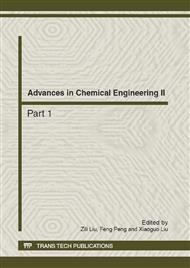p.2964
p.2968
p.2972
p.2977
p.2981
p.2986
p.2992
p.2996
p.3004
Formation Mechanism and the Solving Measures of Sediments in Surface Pipelines of ASP Flooding
Abstract:
As a result of the base-rock corrosion effects and the suspension-carrying capability of polymer in the system of strong base ASP flooding, the concentration of silicon ions in reservoir liquid increases. As the liquid flows into the surface pipelines with tracer heating water injecting, thermodynamics and kinetics conditions change. Suspending power and pH value also decrease. Heavy oil (which content is more than 25%), silts, carbonates and silicates co-deposite, which can cause surface pipelines jamming and even production stopping. Physical or chemistry methods can prolong the rinsing cycles of surface pipelines. Pilot tests indicated that injecting resistance sedimentation agents cost little which had a long rinsing cycle above one year. Hot washing technology had a low cost but with a short rinsing cycle about 2-4 months and the treatment efficiency was easy influenced by the content of oil in blockages. Cavitating water jets technology had good effects and its rinsing cycle were 6 months but cost was high.
Info:
Periodical:
Pages:
2981-2985
Citation:
Online since:
July 2012
Authors:
Keywords:
Price:
Сopyright:
© 2012 Trans Tech Publications Ltd. All Rights Reserved
Share:
Citation:


